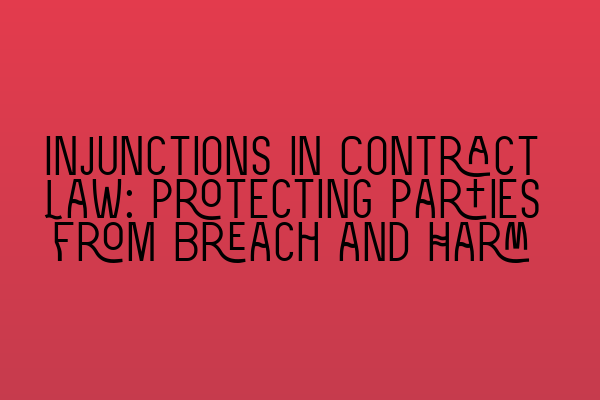Injunctions in Contract Law: Protecting Parties from Breach and Harm
Welcome to SQE Contract Law! In this blog post, we will delve into the topic of injunctions in contract law and how they serve to protect parties from breach and harm. Injunctions play a critical role in ensuring the enforcement and preservation of contractual rights and obligations. Whether you are a solicitor, a law student, or simply interested in understanding more about contract law, this article aims to provide you with valuable insights into the concept of injunctions and their significance in contractual disputes.
Before we explore the world of injunctions, let’s briefly recap our related articles for a comprehensive understanding of contract law:
- Interpreting Contractual Clauses: Unlocking the Hidden Meanings
- Agreements in Contract Law: Understanding Its Various Types
- Essentials of Consideration: Understanding the Basis of Contractual Exchange
- Contract Law Tutorials: Simplifying Complex Concepts for Students
- Discharge of Contracts: Modes and Consequences Explained
Understanding Injunctions in Contract Law
First and foremost, let’s define what injunctions are in the context of contract law. An injunction is a legal remedy sought by parties to prevent or restrain someone from engaging in certain actions that may result in a breach of contract or cause harm to one of the parties involved. Injunctions serve as a powerful tool to safeguard contractual rights and provide necessary relief when breaches occur.
The purpose of an injunction is to maintain the status quo, ensuring that the contractual obligations and expectations are preserved until the dispute is resolved through litigation or alternative dispute resolution methods. Injunctions are granted by the court and can be both prohibitory and mandatory, depending on the circumstances of the case.
During the course of a contractual dispute, one party may seek an injunction to restrain the other party from performing a particular action that violates the terms of the contract or causes irreparable harm. By obtaining an injunction, the aggrieved party can prevent further breaches and mitigate potential damages, thereby protecting their rights and interests.
The Importance of Injunctions in Contractual Disputes
Injunctions play a vital role in contract law for several reasons:
- Preservation of Rights: Injunctions help preserve the rights and obligations agreed upon by the parties involved, ensuring the integrity and enforceability of the contract.
- Risk Mitigation: By obtaining an injunction, the affected party can mitigate the risk of irreparable harm or financial loss that may result from the breach of contract.
- Enforcement Mechanism: Injunctions provide an effective means of enforcing contractual obligations and preventing further breaches, acting as a deterrent to potential wrongdoers.
- Prompt Resolution: Seeking an injunction expedites the resolution of contractual disputes, allowing parties to resume their business operations without undue delay.
It is worth noting that the court has the discretionary power to grant or deny an injunction based on the merits of the case. It considers various factors such as the likelihood of success on the merits, the balance of convenience, and the adequacy of other remedies available to the parties. Therefore, it is crucial to present a compelling case when seeking an injunction to maximize the chances of success.
Types of Injunctions
There are two primary types of injunctions in contract law:
- Prohibitory Injunctions: Also known as negative injunctions, these orders prohibit a party from taking certain actions that would breach the terms of the contract or cause harm. Prohibitory injunctions aim to maintain the status quo and prevent potential damage.
- Mandatory Injunctions: Conversely, mandatory injunctions require a party to take specific actions to prevent a breach or mitigate harm. These orders compel a party to fulfill their contractual obligations or rectify any potential breaches that have already occurred.
The type of injunction sought depends on the nature of the breach and the desired outcome. The court carefully weighs the circumstances and the potential impact on both parties before granting an injunction.
Conclusion
In conclusion, injunctions play a crucial role in contract law by safeguarding parties from breach and harm. By seeking an injunction, the affected party can protect their contractual rights, mitigate potential damages, and ensure the preservation of the agreed-upon obligations. Understanding the types and significance of injunctions is essential for solicitors, legal professionals, and anyone seeking to navigate the complex world of contract law.
If you found this article informative, we recommend reading our related articles for a deeper understanding of contract law:
- Interpreting Contractual Clauses: Unlocking the Hidden Meanings
- Agreements in Contract Law: Understanding Its Various Types
- Essentials of Consideration: Understanding the Basis of Contractual Exchange
- Contract Law Tutorials: Simplifying Complex Concepts for Students
- Discharge of Contracts: Modes and Consequences Explained
Thank you for visiting SQE Contract Law. For any legal assistance related to injunctions or contract law, please contact our team of experienced solicitors. We are here to help!
